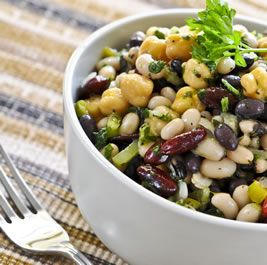Heart Healthy Diet – Why Pills Are Not Enough
“I’m taking pills, so I’m fine. I don’t need a heart healthy diet.” That’s how many people with risk factors like high cholesterol feel.

“Dietary modification has benefits in addition to those seen with aspirin, angiotensin modulators, lipid-lowering agents, and beta blockers.”
Heart disease histories
The international study followed 31,546 men and women from 40 countries over a five-year period. They averaged 66.5 years of age and had previously suffered a heart attack, stroke, or diabetes with related organ damage. All were at high risk for further complications or death. And all were already taking medications to reduce blood pressure and lower cholesterol in order to prevent such negative outcomes.
Highest dietary score
The patients were asked to describe the foods they were eating, and the study’s researchers ranked them according to the healthfulness of their diets. Those with the highest scores had diets similar to the Pritikin Eating Plan. They ate a lot of fruits, vegetables, and whole grains. They also consumed more fish than meat, and they ate fewer eggs, dairy products, fried foods, sodium, and sugar-sweetened beverages.
During a follow-up of five years, participants experienced 5,190 cardiovascular events.
The researchers found that those who ate a heart healthy, Pritikin-style diet had a:
- 35% reduction in risk for cardiovascular death;
- 14% reduction in risk for new heart attacks;
- 28% reduction in risk for congestive heart failure; and
- 19% reduction in risk for stroke.
It’s never too late
Invariably, we of the Pritikin mindset have heard a family member or friend grumble at us: “Leave me alone. I’m too old to change the way I eat. And anyway, what’s the use?”
Not only does this new study in Circulation confirm the value of a heart healthy plan like Pritikin, it debunks the myth that people can be too old or sick to make healthy changes. It proves that change even at a later age can be very useful – indeed, life-saving.
States lead researcher Dr. Dehghan: “Physicians should advise their high-risk patients to improve their diet and eat more vegetables, fruits, whole grains, and fish. This could substantially reduce cardiovascular recurrence beyond drug therapy alone and save lives globally.”
Sources
1 Circulation, 2012; 126: 2705.
Author, Eugenia Killoran